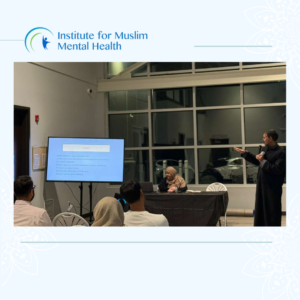Blog
Share your insights, research, and stories to inspire and empower our community.
Our blog is a hub for engaging and evidence-based resources tailored to the needs of the Muslim community. This is your opportunity to share your insights, research, and experiences with a global audience while contributing to mental health awareness and advocacy.
Coping with Grief in Islam | Recapping the Moment
On October 25th, 2025, the Shifa Institute and the Institute for Muslim Mental Health collaborated to host a mental health talk, “Coping with Grief in Islam”, featuring Dr. Omar Reda.
Read MoreOpen Space Resistance
By Dr. Zain Ali Shamoon for ramble cats like us, who scribble out loud out here we are likely to meet people who detract and tell us to keep our voices down they tell us to “keep your voices down!” out here but they don’t know the pathways that moved our collective…
Read MoreReclaim Spiritually
By: Ayah Issa So, you’ve recognized you’ve gone through spiritual abuse, did what you could to stop it, did what you could to alter your Spirituality, but Spirituality has become triggering. Every time you hear a sheikh screaming in the microphone about hell, you feel it. Every time you want to pray, you sit wondering…
Read MoreWe invite mental health professionals and community members to contribute by sharing insights, research, and relevant resources. Email your submissions to blog.editor@muslimmentalhealth.com.
Learn about our Blog Structure and Submission Guidelines to get started.





